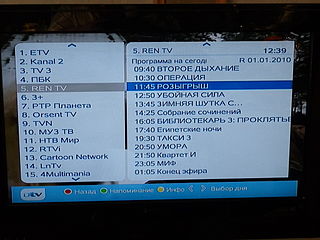Related Research Articles

A television channel is a terrestrial frequency or virtual number over which a television station or television network is distributed. For example, in North America, "channel 2" refers to the terrestrial or cable band of 54 to 60 MHz, with carrier frequencies of 55.25 MHz for NTSC analog video (VSB) and 59.75 MHz for analog audio (FM), or 55.31 MHz for digital ATSC (8VSB). Channels may be shared by many different television stations or cable-distributed channels depending on the location and service provider
A television network or broadcaster is a telecommunications network for distribution of television program content, where a central operation provides programming to many television stations or pay television providers. Until the mid-1980s, television programming in most countries of the world was dominated by a small number of terrestrial networks. Many early television networks evolved from earlier radio networks.
Public broadcasting involves radio, television and other electronic media outlets whose primary mission is public service. In many countries of the world, funding comes from governments, especially via annual fees charged on receivers.

The British Forces Broadcasting Service (BFBS) provides radio and television programmes for Her Majesty's Armed Forces, and their dependents worldwide. Editorial control is independent of the Ministry of Defence and the armed forces themselves.
Pay television, also known as subscription television, premium television or, when referring to an individual service, a premium channel, refers to subscription-based television services, usually provided by multichannel television providers, but also increasingly via digital terrestrial, and streaming television. In the United States, subscription television began in the late 1970s and early 1980s in the form of encrypted analog over-the-air broadcast television which could be decrypted with special equipment. The concept rapidly expanded through the multi-channel transition and into the post-network era. Other parts of the world beyond the United States, such as France and Latin America have also offered encrypted analog terrestrial signals available for subscription.
Free-to-air (FTA) services are television (TV) and radio services broadcast in clear (unencrypted) form, allowing any person with the appropriate receiving equipment to receive the signal and view or listen to the content without requiring a subscription, other ongoing cost, or one-off fee. In the traditional sense, this is carried on terrestrial radio signals and received with an antenna.

The Filipino Channel, commonly known as TFC, is a 24-hour global subscription television network based in Daly City, California with studio in Redwood City, California and offices in Africa, Australia, Brazil, Canada, Cayman Islands, UAE, Ethiopia, Hungary, Israel, Japan, Mexico, Middle East, the Netherlands, New Zealand, South Africa, Malaysia, Singapore, Thailand, Indonesia and the United Kingdom. It is owned and operated by the Filipino media conglomerate ABS-CBN Corporation. Its programming is composed primarily of imported programs from Filipino cable channel Kapamilya Channel and programs produced and distributed by ABS-CBN Entertainment (entertainment) and ABS-CBN News and Current Affairs, while the ABS-CBN television network is currently inactive due to its shutdown.
The BBC is forbidden under its charter to directly undertake any commercial operations on-air within the United Kingdom; however, no such restriction applies to operations in other countries. Therefore, the BBC exploits its massive television archive by operating a number of commercial television channels outside the UK through its BBC Studios subsidiary.
There are a number of media ministries associated with the Seventh-day Adventist Church. These come in print, radio and television forms and reach countries all around the globe. The Adventist church has a long history of media-based communication, having grown out of the Millerite movement of the 1840s which heavily used the print media. Some of the media ministries are directly funded by the church, while others are self-supporting organizations that rely on donations.
Television in Pakistan started in 1964 and the first live transmission of Pakistan Television began on November 26, 1964, in Lahore.
Television in Bulgaria was introduced in 1959. Although the Bulgarian media market is small, it is one of the most vibrant and highly competitive in Central and Eastern Europe. Global players such as News Corporation, Modern Times Group, Central European Media Enterprises, Fox Broadcasting Company and others operate the biggest and most popular media outlets in the country.
Afghan TV is an Afghan commercial television station, based in its capital, Kabul. Launched on May 21, 2004, it is owned by Ahmed Shah Afghanzai, an Afghan entrepreneur. It originally broadcast for 18 hours daily, but has been broadcasting for full days since July 2004. The CEO of this Afghan TV channel is Mohammad Hamayoon Sepehr
Ariana Afghanistan International TV is a satellite television channel based in Irvine, California, United States, with branches in Hamburg and Kabul. It was launched on 1 July 2006, and is owned by Nabil Miskinyar. Since its launch till 2009, it was based in Orange, California.

AVT Khyber or Khyber TV is a Pakistani-operated Pashto satellite television channel in Pakistan, which was launched in July 2004. The channel broadcasts 24 hours a day, providing educational, news, variety shows, dramas, and entertaining programs to the Pashtun population of Pakistan and Afghanistan as well as those living in the Middle East, Europe and Australia. Unlike most TV stations in Pakistan, AVT programs are only in Pashto language.

Noorin TV, sometimes shortened as NTV, is a private non-governmental satellite television network that broadcasts from Kabul in Afghanistan. The service was launched in 2007.
The Central Television of the USSR was the state television broadcaster of the Soviet Union.

NASA TV is the television service of the National Aeronautics and Space Administration (NASA). It is broadcast by satellite with a simulcast over the Internet. Local cable television providers across the United States and amateur television repeaters may carry NASA TV at their own discretion, as NASA-created content is considered a work of the U.S. government and is within the public domain. NASA TV is also available via various cable, satellite, and over-the-top media services around the world. The network was formally created in the early 1980s to provide NASA managers and engineers with real-time video of missions. NASA has operated a television service since the beginning of the space program for archival purposes, and in order to provide media outlets with video footage.
Television in Afghanistan started broadcasting in August 1978, flourishing until the 1990s, when hostilities in the capital Kabul destroyed broadcasting infrastructure. Between 1996 and 2001, the Taliban government outlawed television, though some stations in areas outside Taliban control continued to broadcast. After their removal, country-wide television broadcasting was resumed beginning with the government-run channel Afghanistan National Television. It was reported that Afghanistan currently has over 200 local and international television channels, 96 in Kabul and 107 in other provinces of the country. In 2014, the country commenced a switch from analog to digital TV transmission.

Sharq Television or Sharq TV is an Afghani Pashto language private television station based in Jalalabad, Afghanistan that is owned by Shaiq Network and its founder Shafiqullah Shaiq. There was no private TV Channel at the time in the east region, after the operation of the Radio Sharq for five years, Sharq TV was the first TV Channel that launched in mid-2008. The Channel broadcasts 24 hours a day, providing educational, news, shows, dramas, and entertaining programs to the eastern region of Afghanistan. Sharq TV programs are mainly (90%) in the Pashto language. It transmits hourly news, current affairs programs, entertainment programs, politics programs, sports programs, and criminal incidents programs. Sharq has been attacked five times since its operation from grenade attacks to rocket launchers, the attackers were killed in the last attack caused by a mine displaced incorrectly in the headquarters of the channel. The Channel started broadcasting its services through TürkmenÄlem 52°E / MonacoSAT Satellite on 7 March 2020 with the Following Frequency 10845, SR: 27500, POL: V 52.5. Sharq TV also provides an online stream of its Channel 24/7.

Telefe Internacional is the international signal of Argentine television channel Telefe. It broadcasts television programs produced by Telefe, mostly consisting of telenovelas, series, comedies, teen and children's series, etc. It is available in countries outside Argentina. In the US and some territories, the channel is distributed by ViacomCBS Domestic Media Networks.